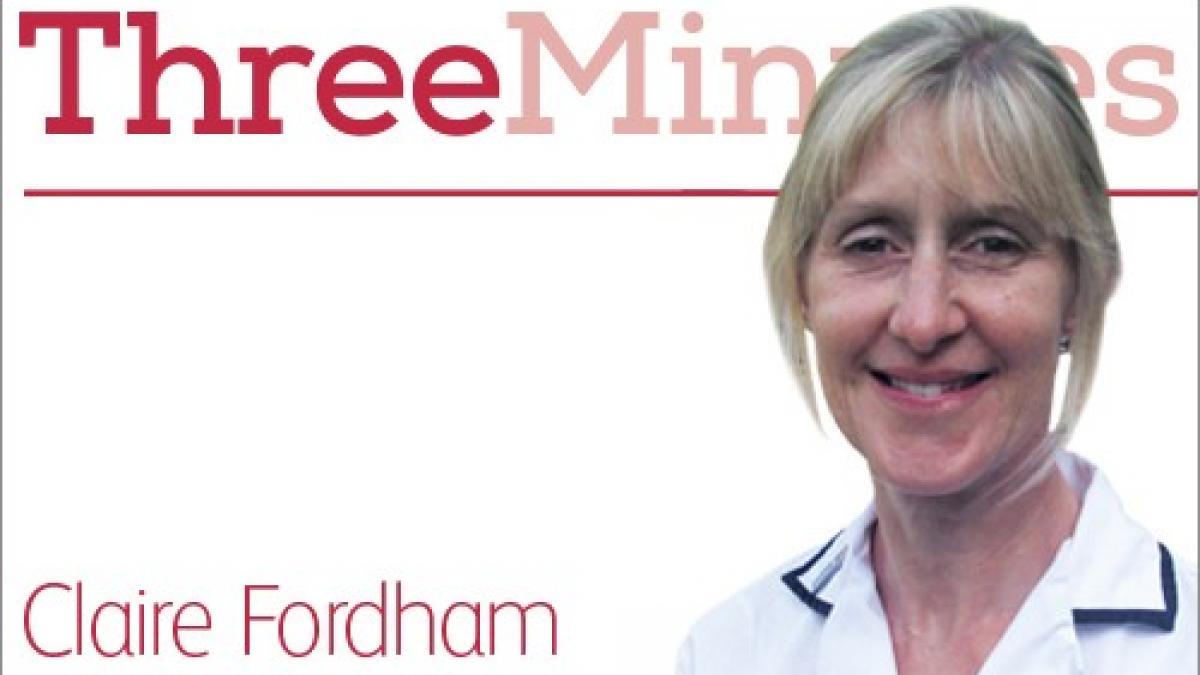As a therapy lead, Claire Fordham is convinced that kindness, humility and humour are essential components in building successful therapeutic relationships.

Leading from the front
Tell us about your role as therapy lead
After qualifying as a physiotherapist in 1990 , I have enjoyed a diverse career working mainly in neuro-medical clinical roles in primary, secondary and tertiary care. I’ve also held a research post and undertaken postgraduate study – I have a master’s degree in advancing health care practice. I worked as a band 7 team lead in two roles for many years before moving to my current post at a rapidly developing and progressive hospital in 2013.
As one of three therapy leads, I support our physiotherapy inpatient services and our integrated therapy and nursing acute assessment and frailty team. Additionally, I provide professional leadership and support for all other physio services. My role is very busy and I can be doing anything from helping with patients on the wards, leading a governance meeting or representing therapies at a divisional business meeting. I particularly enjoy supporting colleagues from other disciplines. This aspect of my role enables me to see things differently, helping me to appreciate the whole patient experience and drive practice with a common purpose.
Give three tips for developing a career
- keep connected to patients: they ground you and remind you why you chose to work in health care
- move out of your comfort zone, seek non-traditional opportunities and don’t be afraid to step sideways
- believe in your physiotherapy skills, expertise, passion and values. They will equip you more to move into advanced practitioner and leadership roles in any speciality or setting, and at any level.
What is your approach to leadership?
I think I’m a compassionate leader. As a clinician, I’ve learned that kindness, humility and humour are essential to successful therapeutic relationships. These values translate well to leadership and I try hard to live them in practice every day. I’m fiercely passionate about the role and value of therapies to patients, organisations and systems and I work hard to get that message out there.
How do you introduce change?
The time is ripe for physiotherapy to thrive – there is so much scope for us to contribute to optimising patient outcomes and system efficiencies. But to realise these opportunities we must boldly scrutinise and evolve our practice and demonstrate our impact. This can only be achieved through cycles of continued evaluation and change. It’s important that this message is understood by staff and that change is a team effort. With any changes, I start by seeking to fully understand colleagues’ attitudes to proposed changes, working with key staff, including our staff side representatives, to find palatable ways forward before any formal consultation takes place.
Any other changes ahead?
Like other similar-sized organisations, we are constantly challenged to run fair, sustainable and safe on-call services. I believe that a solution to the issue of unsocial hours cannot be directed by the CSP: we must find local solutions to local problems. I have been working closely with all physiotherapy colleagues to develop an approach that will match roles and skill sets to on-call commitments. This way, role expectations are clear and, through our trust’s flexible-working policy, we can make and review any personal adjustments that staff may need.
How to win a case for more staff?
A strong, well-written business case is imperative. It’s also important to ‘sell’ your services – taking every opportunity to present your values, aims, objectives and findings. You must be prepared to live your service and all that you and it have to offer. The winning case for our frailty team was the result of a successful pilot and also the supportive impact the team had on colleagues throughout the trust. By week one of the pilot, one of our acute physicians said they couldn’t imagine how they had ever coped without the team.
There is no doubt that support from influential colleagues and a pilot team of clinicians was critical to the success of this particular case, which led to eight new therapy and nursing roles. fl
- Claire Fordham is a therapy lead at Milton Keynes Hospital NHS Trust
Author
Claire Fordham is a therapy lead at Milton Keynes Hospital NHS TrustNumber of subscribers: 2
